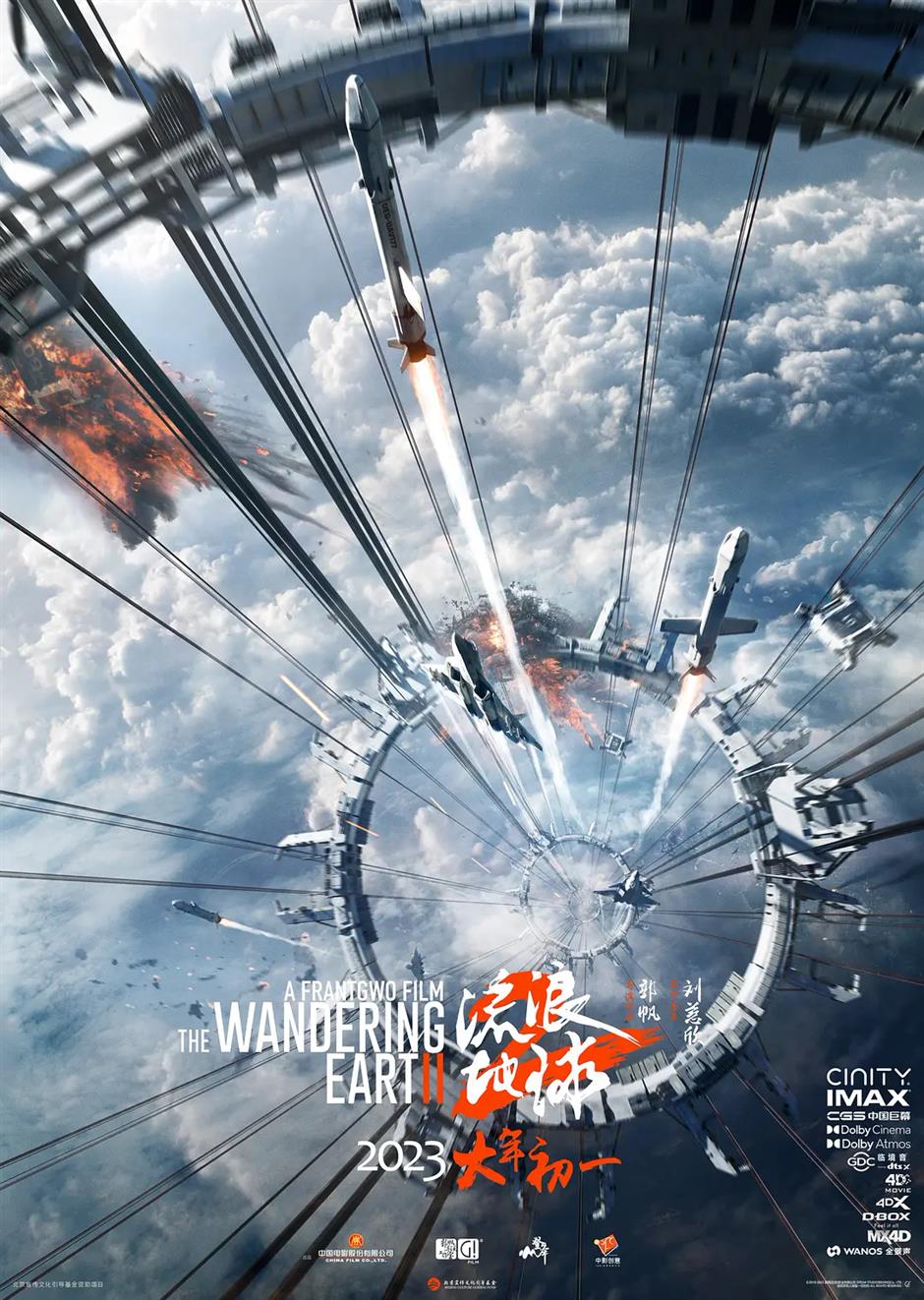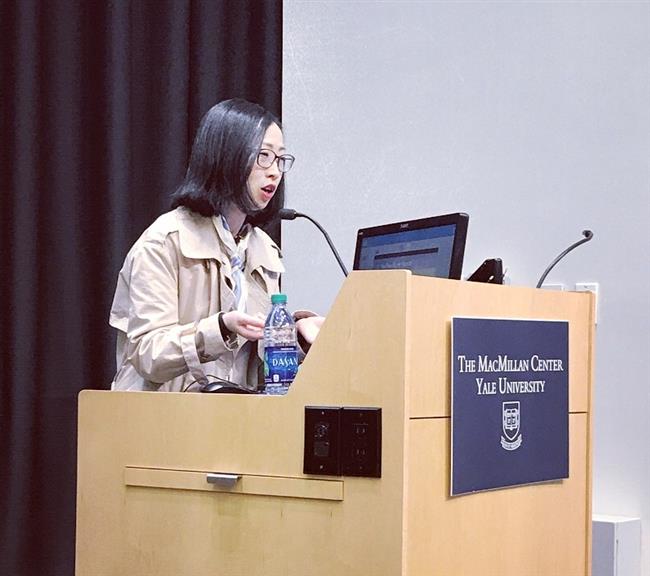Blockbuster movie energizes the science fiction realm in China

A poster for "The Wandering Earth II"
The Chinese science-fiction blockbuster "The Wandering Earth II" broke into the Top 10 movies in the North American weekend box office, but beyond ticket sales, the film is a landmark shot in the arm for the burgeoning sci-fi sector in China.
The film, which has raked in US$4.12 million in North America since its release there on January 22, has drawn missed foreign reviews. The New York Times called it "conspicuously nationalistic," but other critics hailed it as one of the best sci-fi films so far this century. On IMDb, it received an eight out of 10 rating.
The movie, based on the work of renowned sci-fi writer Liu Cixin, is a prequel to the 2019 sci-fi epic. It depicts how mankind puts aside earthly disputes as a rapidly burning sun threatens to annihilate the planet. The solution? Build 10,000 enormous engines to propel Earth out of its solar system into some more habitable corner of the cosmos.

Chinese actor Wu Jing plays the lead role of an astronaut.
Some foreign movie buffs say the film's visuals top even the best of Hollywood, noting that the movie goes beyond typical Hollywood-style blockbusters that focus on individual heroism.
A netizen who goes by the online name "wbszds" said on IMDb that the film "is not full of extreme nationalism. In the story, governments of various countries cooperate, and world astronauts sacrifice themselves for all human beings. The choice of so many characters in the face of disaster takes the emotional control of the film to a high level difficult to achieve in general-release commercial films."
On Twitter, foreign viewer Dimitri Kraus called it an excellent blockbuster – a complex disaster flick for the digital age, probing global anxieties and grounding expressionist imagery in earnest humanism.

The film's space elevator is among the talked-about special effects.
The film is shot from a global perspective, but criticism of "nationalist messaging" mostly focuses on a scene in the movie where Chinese diplomat Zhou Zhezhi says, "Our men are sure to accomplish the mission," even though the Chinese Internet team has already reported failure in starting the gigantic engines.
In the eyes of many film bloggers, the movie's hidden clues and plot about the growth of the super intelligent quantum computer MOSS might be overlooked, and that leads to a misunderstanding of Zhou's words.
The film contains latent flashback shots to imply that Zhou is the only person who knows that MOSS has already evolved into independent consciousness to challenge mankind, but there is still a vital variable to stop it.
The movie's director, Frant Gwo, told Chinese media that people should always be cautious about possible influences posed by cutting-edge technologies like artificial intelligence and the metaverse.

Frant Gwo, director of "The Wandering Earth II"
Online in China, many scientists and scholars have joined discussions on the feasibility of some of the technologies in the movie, such as a space elevator and artificial-intelligence quantum computers.
Many of the film's enthusiasts have watched it multiple times to try and figure out the hidden clues and metaphors, offering predictions for the plot of a possible sequel.
Local sci-fi fan Kevin Zhang, an administrative manager in his 40s,said he considers the film a milestone in Chinese science fiction.
"It doesn't mean that it has no flaws," Zhang said. "My friends and I love it because we have waited a long time for a really powerful homegrown sci-fi epic after Hollywood productions dominated the genre for decades. I think the movie is a textbook-level masterpiece."

Perhaps the movie's ultimately greatest impact will be its ripple effect on China's emergence as a potent force in the realm of science fiction.
The film's success follows on the heels of the worldwide popularity of the award-winning, best-selling sci-fi novel "The Three-Body Problem" by Liu Cixin. Netflix is adapting the novel into a film series.
Lao She's modern sci-fi satire "City of Cats," considered the first Chinese sci-fi work of note, was published in an English version in 1964. That led to a golden age for Chinese sci-fi between 1978 and 1983, when a number of novels were published.
Science fiction was slower to develop in China's movie industry, partly due to lack of expertise in special effects. It's not that the Chinese lacked imagination but rather the mechanics of turning it out for the big screen. That has changed.
"We're proud that the mechanical devices and precision electronic components in many scenes of our movie were made by Chinese creators," said director Gwo.

The Shanghai International Film Festival has included sci-fi filmmaking topics to its film forums.

Chinese sci-fi novelists and scriptwriters use film festivals to meet and exchange views with veteran foreign filmmakers in the genre.
Still, there is more to be done. More creators need to be nurtured to adapt new technologies to the needs of science fiction plots.
Additionally, the number of professional sci-fi writers in China is still small – with only about 160 novelists in the genre on the Chinese mainland and only a third of them keep writing top-quality fiction. That contrasts with an estimated 1,500 original sci-fi writers in the US.
Chinese sci-fi writer and editor Wang Kanyu has published around 30 novels, many of which have been translated into foreign languages. She calls the writing process a combination of imagination and logic.

Chinese sci-fi writer Liu Cixin greets fans at a book signing ceremony in Istanbul, Turkey, to promote his novel "The Three-body Problem."
The popularity of "The Wandering Earth II," in her opinion, is not simply pushing China's sci-fi filmmaking to a new height but also generating an enthusiasm that will encourage more talent to take up science fiction writing and filmmaking.
"It is really important to cultivate high-level translators to this field," Wang said. "Their work deserves good pay, whereas that has not always been the case."
Professor Shi Chuan, vice president of the Shanghai Film Association and a film expert from the Shanghai Theater Academy, said Chinese sci-fi writers and directors need to reflect on subjects about a shared future for mankind and offer persuasive Chinese solutions to them.
"They also need to improve their capabilities of cross-cultural communication," Professor Shi added. "Their stories should be rooted in the reality and culture of China, but told with a global perspective."

Chinese sci-fi writer Wang Kanyu gave a lecture on the development of Chinese sci-fi for students at Yale University.
The world of Chinese sci-fi novels:
A lot of high-quality Chinese sci-fi novels with original ideas have emerged over the years. The following are some of the other novels in the genre that may inspire new films:
Published in 2013, Chen Qiufan's "Waste Tide," set in a small town, is about a US company attempting to change a local government and "Silicon Isle" leaders' recycling of e-waste. The novel also touches on the challenges of globalization. It has been translated into multiple languages like English, Spanish and German.

He Xi's novel "Sentient Beings," published in 2012, is about scientific efforts to create five new worlds based on the secrets of the Planck constant, when the Earth's population explodes. However, these worlds become origins of sin.
Published in 2020 in the American fantasy and sci-fi magazine "Clarkesworld," Wang Kanyu's "The Language Sheath" tells the story of a woman fiercely proud of her mother tongue. But she goes to the extreme when she tries to help build an automatic translation system.
Hao Jingfang's "Wandering Under the Vault of Heaven," published in 2016, is about how a group of earthlings migrate to Mars and launch a war of independence against Earth.















